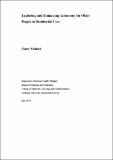| dc.contributor.advisor | Murphy, Kathy | |
| dc.contributor.author | Welford, Claire Lisa | |
| dc.date.accessioned | 2012-11-08T09:52:50Z | |
| dc.date.available | 2012-11-08T09:52:50Z | |
| dc.date.issued | 2012-10-25 | |
| dc.identifier.uri | http://hdl.handle.net/10379/3043 | |
| dc.description.abstract | The purpose of this study was to explore autonomy for older people in residential care. A single exploratory embedded case study design was used.
The case study was adopted for the purpose of gaining a better understanding of resident autonomy from multiple perspectives and multiple data sources. Prior to commencing the data collection phase of the research, a concept analysis of autonomy for older people in residential care was undertaken. This analysis was used to inform the development of the data collection tools. This first phase of the research included interviews, observations, documentary analysis and a staff attitude survey. Analysis of the findings from phase one revealed that there were problems with resident autonomy in the case study site. Two main themes emerged from the findings: The Personal and Being Personal.
Findings from phase one resulted in a second phase of the research whereby staff participants enhanced one aspect of resident autonomy. Phase two was guided by action research principles in order to introduce a change in practice. Care plans with a focus on autonomy were designed and implemented in order to enhance the residents autonomy.
Discussion of the findings from both phases of the research was summarised into promoting and prohibiting factors for resident autonomy.
Recommendations are made in relation to the knowledge, skills and attitudes that health care professionals working with older people in residential care need to possess. Recommendations are also made for encouraging negotiation, biographical care planning and facilitation of resident decision making in residential care. Additional recommendations are made for further research which will extend the operationalisation of the concept of resident autonomy. | en_US |
| dc.rights | Attribution-NonCommercial-NoDerivs 3.0 Ireland | |
| dc.rights.uri | https://creativecommons.org/licenses/by-nc-nd/3.0/ie/ | |
| dc.subject | Autonomy | en_US |
| dc.subject | Older people | en_US |
| dc.subject | Residential care | en_US |
| dc.subject | Nursing and Midwifery | en_US |
| dc.subject | Medicine, Nursing and Health Sciences | en_US |
| dc.title | Exploring and enhancing autonomy for older people in residential care | en_US |
| dc.type | Thesis | en_US |
| dc.contributor.funder | Health Research Board | en_US |
| dc.local.note | Do older people in residential care have autonomy? 'It's a difficult question to answer but a HRB-funded study did the groundwork. And the findings now stand help to enable autonomy for residents and thereby improve person-centred care.
The whole process of engaging with residents, negotiating with them,
knowing who they are as human beings, can influence the decisions that are made every day in a residential care home,' explains researcher Dr Claire Welford. But the first task was to nail down what autonomy meant for older residents in care, because it was surprisingly poorly articulated in the literature. So Dr Welford undertook a concept analysis in her study at NUI Galway that revealed six attributes or ingredients for resident autonomy: that their capacity is encouraged and maintained, they are involved in making decisions, they delegate care needs based on their rights, that care plans are negotiated through open and respectful communication, that the unit has a culture of flexibility
while maintaining resident dignity and that family or significant
others are included if a resident is cognitively impaired. But are those ingredients present in older care in Ireland? Dr Welford carried out a detailed assessment at one residential facility, which
was selected as it would be considered typical. Her analysis found
that autonomy was lacking for residents, so she worked with staff,
residents and their families to facilitate more autonomy-focused care
planning.
Residents are now included in daily decisions about their daily
lives, they are engaged in activities which are meaningful to them and
staff and families engage with each other about the residents likes
and dislikes. | en_US |
| dc.local.final | Yes | en_US |
| nui.item.downloads | 3327 | |


